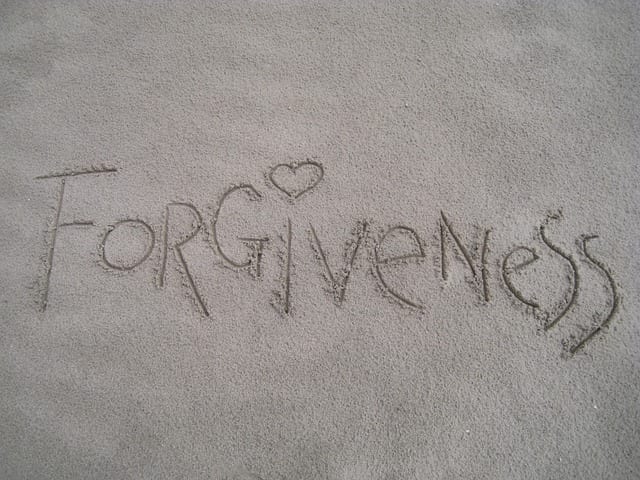
Forgiveness. It’s one of the very hardest things in the world for most of us to do.
Yet, Jesus commands us to forgive others. And not only to forgive them, but to forgive them in the same way that we have been forgiven by God.
Jesus expresses it this way: “A new commandment I give to you, that you love one another: just as I have loved you, you also are to love one another.” [John 13:34; and John 15:12]
But Paul puts a finer point on it:
“Forgive as the Lord forgave you” [Col. 3:13]
“Forgiving one another even as Christ forgave you.” [Eph. 4:32]
That’s a lot of forgiveness. In fact, it’s complete forgiveness that let’s go and forgets, as if the wrong doing never even took place. [Isn’t that the way Jesus has loved and forgiven us?]
But that’s not all that Jesus has to say about the topic. I hope you’re sitting down for this.
Jesus actually says that if we don’t forgive others, then we will not be forgiven either.
Yes. He really does. Right here:
“For if you forgive men when they sin against you, your heavenly Father will also forgive you. But if you do not forgive men their sins, your Father will not forgive your sins.” – JESUS (Matthew 6:14-15)
Whoa Nelly. Is Jesus suggesting that his forgiveness to us is conditional? I’ve never once heard a single sermon on such a thing in my entire life. How can that be?
Perhaps Jesus is forgetting that “if we confess our sins he is faithful and just to forgive us our sins and cleanse us from all unrighteousness”? (1 John 1:9)
And what about the fact that the Psalms tell us that “as far as the east is from the west, this is how far he has removed our sins from us”?(Ps 103:12)
What’s Jesus talking about here? How can he say that we can’t be forgiven of our sins unless we first forgive others of their sins against us?
The reason is very simple: Unforgiveness is a sin.
So, if we hold a grudge against someone, that in itself is a sin. If we refuse to repent of our sin, and if we do not stop practicing this sin of unforgiveness, we cannot be forgiven of it.
In order to receive forgiveness, we have to honestly confess our sins to God and we need to repent of these actions which hurt our relationship with God – and also hurts us as well.
Let’s be frank: Unforgiveness is an emotional cancer. It rots in our chest. It haunts our dreams. It keeps us chained to the source of our pain. It keeps picking at the scab so that the wound may never heal.
Don’t just take my word for it. According to the American Psychological Association, unforgiveness is killing us:
“In one meta-analysis, for example, Yoichi Chida, MD, PhD, found that anger and hostility are linked to a higher risk of heart disease, and poorer outcomes for people with existing heart disease (Journal of the American College of Cardiology, 2009).
“Research has shown that forgiveness is linked to mental health outcomes such as reduced anxiety, depression and major psychiatric disorders, as well as with fewer physical health symptoms and lower mortality rates. In fact, researchers have amassed enough evidence of the benefits of forgiveness to fill a book – “Forgiveness and Health” – that detailed the physical and psychological benefits.
“[In the book, authors], Toussaint and Worthington suggest that stress relief is probably the chief factor connecting forgiveness and well-being. “We know chronic stress is bad for our health,” Toussaint says. “Forgiveness allows you to let go of the chronic interpersonal stressors that cause us undue burden.”
“While stress relief is important, Enright believes there are other important mechanisms by which forgiveness works its magic. One of those, he suggests, is “toxic” anger. “There’s nothing wrong with healthy anger, but when anger is very deep and long lasting, it can do a number on us systemically,” he says. “When you get rid of anger, your muscles relax, you’re less anxious, you have more energy, your immune system can strengthen.”
So, maybe Jesus was on to something? Maybe forgiveness is essential to our own health, and happiness? That means, as hard, or even as impossible, as forgiveness can sometimes be, we have to learn to forgive anyway.
Our own lives may depend upon it.
Now, I know that it’s not easy. But, as C.S. Lewis pointed out, it’s something that most of us find easy to do, depending on the person who needs forgiveness:
“There is someone that I love even though I don’t approve of what he does. There is someone I accept though some of his thoughts and actions revolt me. There is someone I forgive though he hurts the people I love the most. That person is me.” – C.S. Lewis
See, this is why Jesus also commands us to love our neighbor as we love ourselves. Because we give ourselves permission to do horrible things and still consider ourselves worthy of forgiveness and mercy. That means we need to love others enough to consider that they, also, are worthy of being loved and forgiven and shown mercy.
Now, the truth is, forgiveness really has nothing to do with anyone being “worthy” of it. In fact, Jesus never met anyone he didn’t consider unworthy of forgiveness. He just forgave. Everyone. All the time. Usually without even being asked. He just immediately and without reservation said, “Your sins are forgiven you.”
Yes, Jesus wants us to understand something: Our forgiveness is connected to how we forgive of others.
If we are quick to forgive, then we also live as people who are forgiven – free from all condemnation and guilt.
But, if we hold on to condemnation, if we refuse to release guilt, then it remains with us, and we become infected with it. It begins to define us. It starts to fester within.
So, let’s repent of our unforgiveness. Let’s extend the same grace and mercy and love to others that we want so much to enjoy for ourselves.
Remember: forgiving others unlocks you from the prison of bitterness. It sets you free from the bondage of pain. And, it also sets you free to receive your own sweet forgiveness and begin your own process of inner healing.
Until we forgive, we are not forgiven. Until we forgive, we cannot move on and experience healing, and freedom and the joy of Reconstruction.
So…are you ready to forgive?
**
NOTE: If you need help walking through the process, I’m happy to do so. Starting Monday, Sept. 30, I’ll be leading a 90-Day Online Coaching Program called “Square 1” that will take us from Deconstruction to Reconstruction, and this work of forgiveness is a very big part of that.
Learn more at Square 1.
**
Keith Giles was formerly a licensed and ordained minister who walked away from organized church 11 years ago, to start a home fellowship that gave away 100% of the offering to the poor in the community. Today, He and his wife live in Meridian, Idaho, awaiting their next adventure.
Can’t get enough? Get great bonus content: Patreon page.













